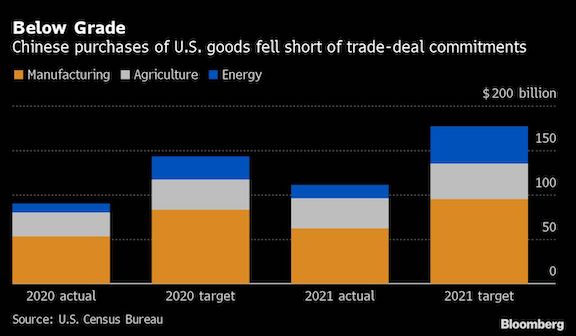The Biden administration said that new trade tools are needed to confront China, which for two decades has failed to keep promises to pursue market-oriented policies that it made to join the World Trade Organization.
China’s state-led model has increased with time and harmed American companies and workers, the U.S. Trade Representative’s office said in a 72-page annual report on the nation’s compliance with the WTO’s rules released on Wednesday. Beijing has used numerous unfair, non-market and distortive trade tactics in pursuit of its industrial-policy objectives, USTR said.

The Biden administration wants the WTO to adopt a joint statement on the importance of market-oriented conditions for fair trade, thereby drawing a contrast to non-market economic practices, with the goal of shaping future WTO reform discussions, the USTR said.
The U.S. is going outside the WTO to pursue solutions to some problems presented by China’s trade policies, including with like-minded partners to pursue new joint strategies to counter China’s increasing use of economic coercion, the report said.
The world’s two largest economies have engaged in a trade war since 2018, and reached a trade deal in early 2020 to ease tensions. But China came up more than one-third short of its purchase commitments for goods in the pact, which some analysts criticized as unreaslistic from the start, as the global pandemic upended supply chains. The U.S. has pledged to hold the nation accountable, without specifying the next steps that it will take.
China had pledged to buy the extra $200 billion in U.S. agriculture, Tai has said repeatedly that the Biden administration’s concerns go beyond the purchase commitments and include Beijing’s state-centered industrial policy.





